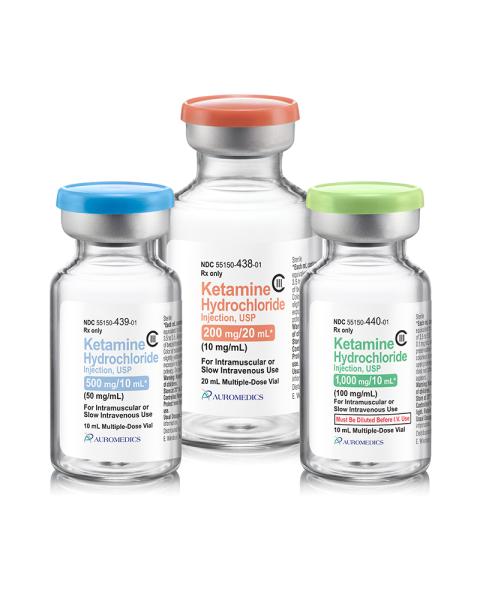Ketamine and Alcohol/Food Interactions
There are 2 alcohol/food/lifestyle interactions with ketamine.
Ketamine Food/Lifestyle
Moderate Food Interaction
GENERALLY AVOID: Alcohol may potentiate some of the pharmacologic effects of ketamine. Use in combination may result in additive central nervous system (CNS) depression and/or impairment of judgment, thinking, and psychomotor skills.
GENERALLY AVOID: Coadministration of oral ketamine with grapefruit juice may significantly increase the plasma concentrations of S(+) ketamine, the dextrorotatory enantiomer of ketamine. The proposed mechanism is inhibition of CYP450 3A4-mediated first-pass metabolism in the gut wall by certain compounds present in grapefruit. Inhibition of hepatic CYP450 3A4 may also contribute. When a single 0.2 mg/kg dose of S(+) ketamine was administered orally on study day 5 with grapefruit juice (200 mL three times daily for 5 days) in 12 healthy volunteers, mean S(+) ketamine peak plasma concentration (Cmax) and systemic exposure (AUC) increased by 2.1- and 3.0-fold, respectively, compared to administration with water. In addition, the elimination half-life of S(+) ketamine increased by 24% with grapefruit juice, and the ratio of the main metabolite norketamine to ketamine was decreased by 57%. The pharmacodynamics of ketamine were also altered by grapefruit juice. Specifically, self-rated relaxation was decreased and performance in the digit symbol substitution test was increased with grapefruit juice, but other behavioral or analgesic effects were not affected.
MANAGEMENT: Patients receiving ketamine should not drink alcohol. Caution is advised when ketamine is used in patients with acute alcohol intoxication or a history of chronic alcoholism. Following anesthesia with ketamine, patients should be counseled to avoid hazardous activities requiring complete mental alertness and motor coordination, such as driving or operating hazardous machinery, for at least 24 hours and until they know how the medication affects them. Patients treated with oral ketamine should also avoid consumption of grapefruit and grapefruit juice during treatment. Otherwise, dosage reductions of oral ketamine should be considered.
References (4)
- Cerner Multum, Inc. "UK Summary of Product Characteristics."
- Cerner Multum, Inc. "Australian Product Information."
- (2009) "Product Information. Ketalar (ketamine)." JHP Pharmaceuticals
- Peltoniemi MA, Saari TI, Hagelberg NM, Laine K, Neuvonen PJ, Olkkola KT (2012) "S-ketamine concentrations are greatly increased by grapefruit juice." Eur J Clin Pharmacol, 68, p. 979-86
Switch to consumer interaction data
Ketamine High Blood Pressure (Hypertension)
Major Potential Hazard, Moderate plausibility
ketamine - hypertension
The use of ketamine is contraindicated in patients whom a significant elevation of blood pressure would constitute a serious hazard. It is recommended to monitor cardiac function continually during a procedure in patients with hypertension or cardiac decompensation.
References (1)
- (2009) "Product Information. Ketalar (ketamine)." JHP Pharmaceuticals
Switch to consumer interaction data
Ketamine drug interactions
There are 424 drug interactions with ketamine.
Ketamine disease interactions
There are 2 disease interactions with ketamine which include:
More about ketamine
- ketamine consumer information
- Check interactions
- Compare alternatives
- Pricing & coupons
- Reviews (168)
- Drug images
- Latest FDA alerts (4)
- Side effects
- Dosage information
- During pregnancy
- Support group
- Drug class: general anesthetics
- Breastfeeding
- En español
Related treatment guides
Drug Interaction Classification
| Highly clinically significant. Avoid combinations; the risk of the interaction outweighs the benefit. | |
| Moderately clinically significant. Usually avoid combinations; use it only under special circumstances. | |
| Minimally clinically significant. Minimize risk; assess risk and consider an alternative drug, take steps to circumvent the interaction risk and/or institute a monitoring plan. | |
| No interaction information available. |
See also:
Further information
Always consult your healthcare provider to ensure the information displayed on this page applies to your personal circumstances.


